News that interest rates are rising to a whopping 5% will have sent chills down the spine of every person in the country with a mortgage.
That’s just under a third of us. Just over a third of the country own their house outright – either because they’ve paid off their mortgage or because their own wealth means they never needed one in the first place.
But millions of people will renew their mortgage over the next few months. And the chances are their rate will double, or as near to it.
In practical terms, they will see an increase of around £200 to £600 a month, depending on the extent of their outstanding mortgage.
The interest rate rise will mean a hit on living standards far higher than any tax increase or public spending cut in recent memory.
And people who followed financial advice and got as big a mortgage as they could afford will find themselves horribly exposed.

In truth, it’s a pretty miserable time to be anything other than property wealthy at the moment.
Inflation is now so out of control, so beyond the reach of the Bank of England, the only real prospect of quashing it is to hope that a recession does it for us.
Interest rate rise will damage small businesses and public sector workers
Some economists and politicians are actively encouraging the economy to stall to break this cycle, no matter the damage that might do to small businesses and the unemployment figures.
Imagine running a small business that has powered through Brexit, navigated Covid and got back onto the front foot, only to land in a world where the government needs people to stop spending.
Where contracting the economy is the goal rather than a sign of failure.
In the midst of the economic pain so many are experiencing there are other voices keen to exploit the situation for their own ends. Not least those who argue that the worst thing we can do at the moment is give people the pay rises they demand because that may in and of itself continue to drive inflation upwards.
Those same people argued against real-term pay increases even when the sun was shining.
It’s why the trade unions are right to stick to their guns and continue with their campaigns for pay justice, given how long so many people have watched their spending power fall.
If people making widgets get a decent pay rise, that meets the cost of living, it’s fair to argue that will lead to the cost of widgets going up and, therefore, contribute to inflation.
But that’s not the case in the public sector where we’re talking about the wages of council workers and nurses.
What will it take to get government to act?
Prime Minister Rishi Sunak this week said we will get through this.
His chancellor says we must stick to our guns and not spook the markets by departing from our course of action.
Both men do so from their position of extreme power and privilege.
Their economic plans are like pieces on a chessboard to be moved freely and sacrificed lightly. And the livelihoods of millions are little more than a puzzle to mull over on the back page of a newspaper.
"The government isn't in the business of alleviating pain, it's in the business of causing pain."
Will Rishi Sunak's plan to use inflation to force people to spend less, nudging inflation down, actually work?
Listen on @GlobalPlayer@maitlis | @jonsopel pic.twitter.com/tXUUkml8zN
— The News Agents (@TheNewsAgents) June 22, 2023
Perhaps if our leaders did have to worry about finding another £200 a month to make ends meet they’d do things differently.
I don’t doubt that they care, but do they really understand?
They were reluctant to act on Covid and lockdowns until they had to. They were reluctant to act on energy bills until they had to. And now they are reluctant to act on spiralling mortgage costs.
The question now is only whether it will take weeks or months before they come to the same conclusion?












